Music Reviews
9 NIGHTS OF LIVE MUSIC - The Tap House
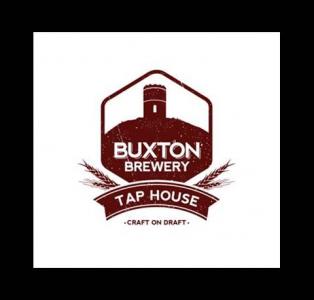
Buxton Brewery Tap House 12-15 & 19-23 July
Buxton Brewery has been one of the town's great successes of recent years producing a staggering (adjective chosen carefully) range of award-winning craft beers. I settled for the modest 4% IPA which was flowery.
The Tap House is a pub first and a music venue second - so don't expect hushed silence while the bands are playing. If you especially want to listen to the music get as close as you can to it and do your best to filter out other sounds. Whilst the Tap is a pub it also hosts the best and most interesting music making in town and its Fringe programme is excellent.
For the opening night this Fringe we heard Lucy Mae - a jazz and blues singer from Manchester - accompanied by Luc Phan on guitar and alto saxophone. The played some standards - Sunny, Blue Skies, Black Magic Woman - as well as some originals.
I guess that they are in their mid-20s but the music they make is of a different generation. They clearly know and love this music and play it with warmth and energy.
The Fringe schedule is packed with quality blues, jazz and folk inspired music from some of the best musicians in the region so make a point of dropping in. The fun starts at about 9.30pm.
Keith Savage
ACAPPELLA AND CAKE - Ordsall Acappella Singers
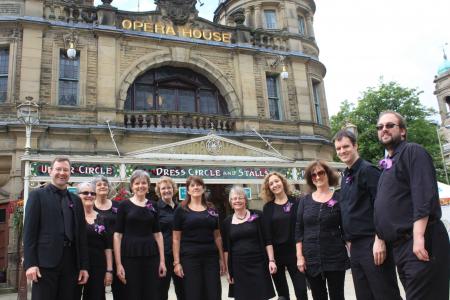
United Reformed Church Saturday 16 July
As food and music are two of my passions, an hour of close harmony singing followed by cake is difficult to resist! It was certainly worth venturing out in the drizzle which constitutes Buxton's summer to enjoy Ordsall Acappella Singers' late morning warm invitation.
Starting with a warm rendition of 'Somewhere' from West Side Story and moving on to 'Somewhere over the rainbow' the audience soon realised they were about to be treated to a programme of familiar songs, served with interesting close harmonies. 'I know him so well', arranged especially for the choir by Barbershop specialist, Dave King, showed skill in sharing the melody between the voice parts, very welcome for singers who usually sing harmony parts.
Conductor, Jeff Borradaile, then told us that these three songs were new to the choirs repertoire - most impressive as all were sung from memory. In fact the whole programme was performed from memory, which showed the choir's commitment to the music through thorough knowledge of the songs.
More popular repertoire followed with 'Can't help falling in love (Elvis), 'I will', a less well-known Beatle song with interesting percussive sounds in the bass accompaniment and Billy Joel's 'Lullabye (Goodnight my angel)'
The next group included pieces which showed the choir's involvement in community projects: 'One day like this' was commissioned by Manchester Metro University for a project commemorating the city's regeneration after the IRA bombings 20 years ago. 'In remembrance' had previously been performed with sister choir 'Blackburn People's Choir'.
As a choir with a non- audition policy, musical director Jeff Borradaile has competently built a choir which masters intricate harmonies and rhythms. Maybe the next stage could be to develop the upper range of the voices, and try some songs higher keys. Most importantly, he has imbued them with an enthusiasm for singing which they obviously want to share with their audiences. They certainly deliver their tagline - 'Singing from the heart of Salford'.
After more songs which included Gospel numbers and a hint towards Christmas with 'Hail, smiling morn' the final group was unannounced to the choir, so we heard obviously established favourites 'I got rhythm', 'It don't mean a thing if it ain't got that swing'. We could now see the choir relaxing and enjoying these songs as they gently swayed to the music.
Unfortunately this review will not be in time for their second performance today, but I thoroughly recommend that you make a note for next year, as they have promised to come again - with more delicious cake!�
Carol Bowns
ACOUSTIC CONNECTIONS WITH RAINTOWN SEERS - Raintown Seers
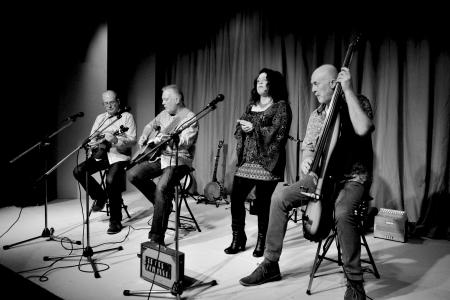
Raintown Seers played a set of folk songs tinged with Americana that was reminiscent of the Jerry DouglasAly Bain Transatlantic Sessions project. Their sound was smooth and very professional. Frontman Neil Fisher was on guitar and vocals with the occasional mandolin. Dan Hall played bass. Lisa Lovatt sang lead and backing vocals and Steve Hyde was the multi instrumentalist on mandolin, banjo, concertina, accordion and occasional vocals. Many of the songs were Neil Fisher originals as well as including some classic and less classic covers.
The covers performed included Gillian Welch's "Wichita", Jimmy Webb's "Wicheta lineman" and Ewan McColl's "The first time ever I saw your face" sung beautifully by Lisa. They also sung the cover of a song that I think was called "Freedom to roam" about the Kinder Trespass.
While the covers were very enjoyable, I found Neil's original songs more interesting with great arrangements and strong vocals from Neil and Lisa. One song called "Overexposed" was about a Boeing aircraft with an interesting history that crashed on Kinder Scout in 1948. "The Mermaid's Pool" is a haunting song about the Derbyshire landmark of the same name. Neil adapted the lyrics from the words of a 19th Century poem."Here come the brides" is about the English women arriving in America to marry their American GIs. "Ghosts on the pass" is a ballad about an infamous murder of an eloping couple on Winnets Pass. The show finished with a moving song that I think was called "The Last Boat" about an arctic whaling expedition that ran into trouble in the ice.
As the name implies the set list made connections between the songs as well as making transatlantic connections between the USA and Derbyshire. Neil and Steve explained the connections and if you want to know more then you need to go and see the show.
Alex Watts
ALL JAZZED UP AND BLUE - Basin Street Jazz & Blues
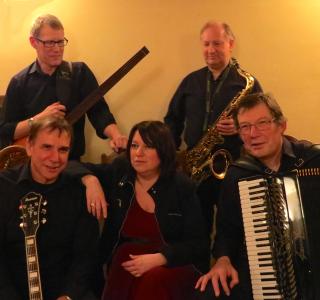
All Jazzed Up and Blue : Basin Street Jazz and Blues
The Old Clubhouse – 10th July 2016
With about 40 people in the audience and a few coming and going, moving between the courtroom and the upper bar, I thought that event was seriously under-attended. Perhaps the clash with the European football final might have kept a few away but if the reports of the match are anything to go by, they missed a talented, accomplished performance that easily outshined its sporting alternative.
The guys in the band were all dressed as ‘men in black’ with the female vocalist Jules M Scott channelling her inner Sandie Shaw. Fred Rolland, Adrian Sherwood, Brian Lightowler, Mike Dale and Dave Attwood complete the line-up of Basin Street Jazz and Blues and combine their experience from many years of playing together and with other bands. Fred told me that they sometimes play as a four piece jazz band without drums and without vocals and as pianist Brian also plays the accordion, occasionally they masquerade as a Cèilidh band! A super-group perhaps?
Before I mention the music (get on with it!), it is worth mentioning Adrian’s fabulous ‘blond’ electric (double) bass. It looked great, very high-tech and sounded every bit as good as it looked.
OK, on to the music. The set was a mixture of well-known and timeless songs from the best blues and jazz artists, scattered with some quality original songs written by band members. The set was divided into two sections with a 20-minute break in the middle to replenish drinks at the bar.
The set started with the instrumental ‘Evening Sunrise’ written by band member Mike. Great Jazz Sax playing led the number and set the scene well, giving all of the instrumentalists an opportunity to shine. The smooth vocals of Jules were first introduced in the second song ‘What a difference a day makes’, originally made famous by Natalie Cole. Song number four was the Jango Reinhardt hit ‘Sweet Georgia Brown’. This slightly up-tempo version gave some space for some very accomplished saxophone and piano improvisation and the bass and guitar breaks had a sound reminiscent of Les Paul. Song five was subject to a rather questionable joke about paternity but thankfully the quality of the music was unaffected and ‘Is you is or is you ain’t my baby’ had the pleasing air of the Stray Cats about it. By song seven, Jules’ vocals really came into their own and the rendition of the Nina Simone song ‘Don’t let me be misunderstood’ was fabulous. Her vocal range had a stern test in Melody Gardot’s ‘If the stars were mine’ but this test was one passed with flying colours – perfect. The last song before the interval was an original piece by guitarist Fred Rolland, with lyrics in French. Apparently the words didn’t make sense in English!
The second half of the evening started as the first had done, with an instrumental - this time a ‘Purple patch’ written by band saxophonist Mike. The original work continued with two songs by bassist Adrian, the second of which gave Mike an opportunity to show off his soprano saxophone. A particular favourite of mine came at song eighteen with a rendition of the Elvis Costello track ‘Almost blue’; a song I’d heard live from the man himself only a few months ago and this version was well worth the ticket price alone. As the evening progressed, Fred’s jokes got worse but the music got better. Jules suggested that they should have been included in the ‘comedy’ section of the Fringe guide but I wasn’t so sure!
When the evening come to a close, the encore song, ‘Summertime’ by George Gershwin capped off a really lovely evening - Jules’ vocals as clear and as blue as you could get. A thoroughly enjoyable evening that I would recommend to all Jazz and blues fans. I hope that my review has given you the encouragement to look out for Basin Street Jazz and Blues when they next come to Buxton.
Len Tildsley
AMARETTI AGAIN - Amaretti Chamber Orchestra
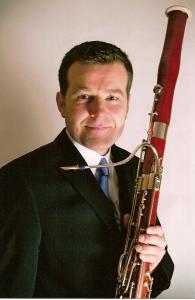
A varied programme, chosen to be in part familiar-enough but not Classic FM material, and in part much less known: and challenging for the musicians. They rose to the challenges with energy, skill and obvious pleasure.
Before the interval, baroque music - a Handel Concerto Grosso and Vivaldi Bassoon Concerto, between them a harpsichord Suite by Gottlieb Muffat. The soloist in the Vivalid was Alex Kane and his performance in this piece was wonderful, not least his dazzling fingering in the sparky music. The harpsichord soloist was Charlotte Turner and she played the Muffat’s three movements with enormous attention to detail and great sensitivity. It was fascinating to see how much, as a soloist, she leaned into the spirit of the music and didn’t simply ‘play the score’, intricate as it is.
After the interval, more-modern music. A Villa-Lobos Ciranda from 1933, and to close the concert Rudolf Barshai’s arrangement into Symphony for Strings of the late 1960s Shostakovich String Quartet No 10. Alex Kane returned for the unfamiliar Villa-Lobos and, again, worked the bassoon expressively in with the strings.
But the triumph of the evening just has to be the Shostakovich. Typical Shostakovich, one might say, with the ominous, the calm, the near-circus, the haunting melodies and the persistent rhythms – it couldn’t be any other composer. The orchestra under their conductor Juan Ortuňo were really magnificent in this, not least when belting out the darker and deeper sounds with great precision, authority and heft. This was a moving and powerful performance.
In summary: a wide-ranging programme, carefully selected to stretch the audience a little and at the same time to reward the musicians with a challenge, two fine soloists, and a tremendous depth of sound from the orchestra itself.
Michael Quine
BIG ROCKING BLUES NIGHT - Herding Catz Blues Band
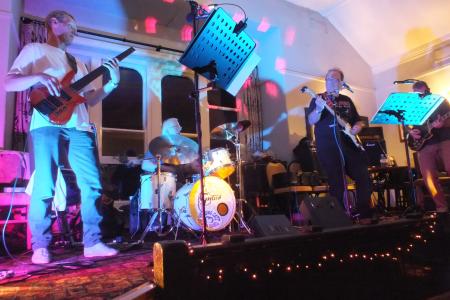
Local group, The Herding Catz Blues Band returned to the Old Clubhouse tonight. The lead singer, rhythm guitarist Peter Buxton spent time rearranging the room before the gig! The café style layout better suited the mood rather than the original straight rows of chairs.
This is twice in a week that I have reviewed a band with Adrian Sherwood playing bass. This time he was showing off his 5 string fretless electric bass guitar rather than the electric double bass from last weeks jazz and blues. Definitely not a case of great kit, no talent though, as Aid once more gave a very assured performance both in his playing and in backing vocals.
The four-piece band are completed by Chris Love on drums and Rob Bradley on lead guitar and together they rocked the fringe tonight with some great rock and blues.
The evening started up-beat with the Bobby Troup song ‘Route 66’, moving through Peter Green’s ‘Homework’, Eric Clapton and Ry Cooder before getting a little heavier with Steve Miller’s ‘Mercury Blues’, Ezio’s ‘Hotel Motel’ and the classic Hendrix song ‘Red House’ which was lit up by Rob’s very impressive soloing. No playing with his teeth though!
A quick chat with Peter during the intermission uncovered that fact that the band members have a combined age of 262 and that they apparently supplement their beer with Sanatogen to give them the stamina to deliver their high-energy performance!
The second part of the evening seemed to get louder and the energy levels had definitely increased. Albert King’s ‘Oh, Pretty Woman’ brought out Peter’s best blues voice and then a modern classic from Joe Bonamassa, ‘Sloe Gin’ gave Rob another opportunity to shine with the complex guitar solo.
The one-hit-wonder from Timbuk3, ‘The Future's So Bright, I Gotta Wear Shades’ give the multi-talented Peter an opportunity to rest his lefty guitar fingers and blow us all away with his fantastic blues harmonica. Slipping into Canned Heat’s ‘World of Make Believe’ when the sucked notes at the end, led to him flapping his arm for Chris to close out the song! No faltering sound though.
After a little ‘walking the dog’, we ‘let the good times roll’ before the encore had us ‘back in the night’ and it was all too soon time to go home! Herdingcatz are back at the Old Clubhouse again on 22nd July. Get yourself down there for a great night of high-octane blues. They must be a shoo-in for an award this year.
Len Tildsley
BLOODY LOVE SONGS - Darren Poyzer

Darren returns to the Fringe with another well-chosen mixture of covers and self-penned songs, this time around the theme of love. His charm and wit are still well to the fore and his voice is in good form, perfectly underpinned by his understated guitar playing. At one point he apologized to ‘any musicians in the room’ for the bum notes, but I honestly didn’t notice any.
Darren likes to add visuals to his songs; perhaps the most arresting were to his second song where we treated to a series of photo-shopped portraits of couples just setting off on married life. Most were intended as humorous, but some were downright weird or even scary. Quite a few depicted either the bride or groom held in the hand or tucked inside the pocket of their spouse – do these people really see their relationship in such terms?
Between songs he also had a few ‘vox pop’ inserts where various friends and acquaintances were invited to define love to the camera. Perhaps the reviewer is a bit of an old ‘seen it all’ dog, but these bits would have been better had any of them actually had anything interesting to say.
There was a point when the set was in danger of getting a bit repetitive, with a series of wistful songs mainly celebrating heterosexual love. Even a song on the theme of love amongst fugitive slaves manages to come over as much romantic as political. Then suddenly he changes tack with the story on an old mentally incapacitated male friend who has recently taken up with a young Thai fellow. Definitely the most ingenious way to introduce ‘Running Bear’ that I have seen, re-casting the old pop tune as a homily to all those whose love has been thwarted by the prevailing customs and practices of where they live.
Darren followed this with a very powerful rendition of the Joy Division classic ‘Love Will Tear Us Apart’. His treatment brings out the full darkness of the lyric; love is not necessarily a comfortable experience. Early in the set he states that marriage is more political than we think and his final song ‘Petticoat Tails’ is indeed a celebration of the diversity of the forms of loving relationships across the world.
So come to Darren’s show of you want to enjoy some simple well-played music and be charmed and challenged at the same time.
Fred Rolland�
BLUESMAN MIKE FRANCIS - STORY OF THE BLUES - Bluesman Mike Francis
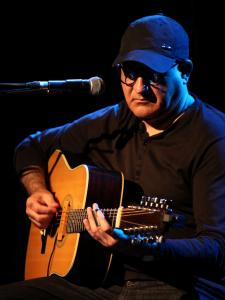
Bluesman Mike Francis (he had to change his name from just ‘Mike Francis’ in 2011 following the death of an Italian singer with the same name, which caused some confusion when gigging in Europe) is celebrating 40 years on the road by revealing the ‘Story of the Blues’ from his upcoming album of the same name.
The storytelling took place upstairs in ‘The Old Clubhouse’, with rows of chairs facing the stage (the only downside to this is there is nowhere to put your drink). Francis perched himself on a stool with a selection of guitars (including a couple of 12-strings) and a bass drum around him.
Buxton was finally basking in the summer sun and a few pounding beats from the drum as Francis launched himself into “Five More Wishes” transported the audience to a blues bar in the Deep South. Before each number, there was a brief introduction to its origins and Francis explained that this first song had origins in ‘Gambler’s Blues’ but also gospel and fans of Adele would recognise some elements in her hit, “Rolling in the Deep”.
Francis continued his set with “Honky Tonk Woman”, telling the audience that Keith Richards and Mick Jagger’s title for the song was originally ‘”Country Honk”. He then sang “Alabama” in the style of Chicago blues which, he explained, developed as a result of the mass migration from the U.S. cotton-growing areas after the 1920s following the outbreak of the boll weevil, a beetle which feeds on cotton buds and flowers, which caused severe devastation to the industry.
Despite being on his own on the stage, Francis was, at times, supported by the use of modern technology to enhance the overall sound quality. He makes no apology for benefiting from some technological advancements as he believes that originals such as Woody Guthrie, were they alive today, would do the same.
The session then took on a rock vibe as Francis performed “The Bank of Hope and Glory”, based on the collapse of Irish banking. His voice lends itself well to rock and his emotion as he sang on a topic close to his heart was obvious.
After “Imelda May”, Francis described the origins of “The House of the Rising Sun” and performed his own version, including a line which amused me greatly, “the only time that she is satisfied in when she’s rolling drunk.”
Much to the delight of the audience, there were also a couple of songs in which he encouraged audience participation, including a sing-along to “Mercedez Benz” (the atmosphere was heightened by growl and grit in his voice accompanied only by the pounding beat of the drum through most of the song) and a call-and-response to “Black Betty” - Bam-ba-lam.
Two particular favourites for this Blues novice were “Timbuktu” (about a lying ex-partner who “may as well be in Timbuktu”) and a song about the dead man’s switch in the style of Oklahoma Train Blues, which had a slow start as the ‘train’ pulls away then speeds up into a thumping rhythm with the addition of the bass drum.
An enjoyable afternoon but, as I say above, I am new to the Blues and would have liked a bit more explanation about how it originated and evolved, i.e. the story of the Blues, and, at times, I found the explanations given a bit confusing. However, the Blues fans in the room may have found that unnecessary. Nevertheless, Francis was passionate about making his show appropriate for children and young people and possibly a bit more of a chronological trip through the development of the Blues would introduce a new audience to its fascinating history.
Sian-Elin Flint-Freel
CANTEMOS - SUMMER SIZZLER - City of Manchester Opera
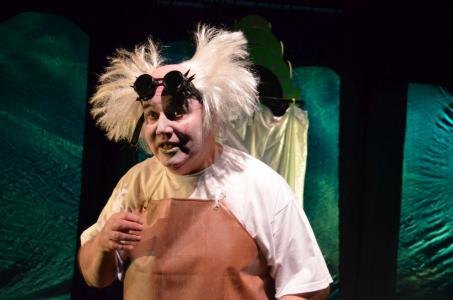
This was the City of Manchester Opera's 'Cantemos!' A Sizzling Spanish Summer Sensation, and what a lovely summers evening it was too!
City of Manchester Opera is a company of professional, semi-professional and trained amateur singers based in Manchester. They have more than 30 members, and this evening's chorus consisted of 23 extremely talented singers of varying ages and backgrounds.
The theme of the evening was Spanish Opera, and it was a fantastic evening that took you through some of the most famous and influential Opera's. The most famous Spanish Opera of course being Carmen, of which Helen Howell gave an outstanding performance of 'Micaela's Aria'.
The second half took a more varied approach to Opera, and although not predominantly Spanish, once again took us through some key historical Opera's such as Don Giovanni and Il Travatore. All the pieces were sung with passion and vigour and the conductor worked to get the most from the chorus working together.
The accompanist Jonathan Ellis is extremely talented and I would recommend seeing him either with the City of Manchester Opera or in another of his performances (he performs as a soloist and as a chamber musician).
This performance was vey accessible to those who may not be Opera enthusiasts but who want to know more. It offers an ideal opportunity as you can experience many Opera's in one sitting, and get a real feel for the energy of the genre.
The City of Manchester Opera are next performing The Magic Flute as part of their 2017 season and I will definitely be catching up with them there!
Louise Neilson
CLOSER TO THE HEART - Hojo and Richard Jurgens - Black Eyed Dog

If you ventured upstairs in the Old Clubhouse on Thursday evening you could be forgiven for thinking that you had been transported back to the early 1970s and the folk rock world of Aqualung and Liege and Lief. Black Eyed Dog are HoJo on guitar and Richard Jurgens on Flute. They treated us to a performance of their new album Closer to the Heart. The duo sometimes perform with a percussionist and an electric viola but this evening was just guitar , flute and HoJo's vocals.
Inevitably the pair must be compared with Jethro Tull because of HoJo's driving guitar style and Richard's soaring flute playing which can be favourably compared with Ian Anderson. However the duo have a their own unique style that is well worth a listen.
All the performed songs were written by HoJo except for an acoustic medley. I particularly enjoyed the powerful delivery of title track "Closer to the Heart" and "Me and You" which reminded me of the inspired ramblings of John Martyn or Stephen Stills. The final songs "Your my World" and "We've got no worries" used alternate tunings which created a very special sound to close the concert.
Black Eyed Dog are playing at the Cheshire Cheese on Friday and Saturday if you want to catch them. They have CD's of Closer To The Heart available for purchase.
Alex Watts
DENNIS POTTER - IN THE PRESENT TENSE - Project Adorno

Underground Venues 16th July 2016.
The Old Hall hotel has been run by Potters for over half a century, therefore was is it a coincidence that Projectadorno were elected to perform their work on the renowned late TV dramatist, playwright and author in the Underground Venue of this hotel?
Projectadorno is a double act, named after the German philosopher Theodore Adorno, Which reflects the intellectual and thorough investigation that forms the bulk of their creation. The audience of 18, admired this production by two young men, armed with guitars, plus a background of a sepia PowerPoint presentation and voiceovers, that traced the short life and talented works of Dennis Potter.
The story was told in full circle, from Potter’s humble beginnings as the son of a coalminer through his brilliance that escalated Potter’s rise to fame, and untimely death at the age of 59. Then back to the beginning, which emphasised the “Rags to Riches” determination of that remarkable man.
The presentation was enhanced by the lyrics and background voiceovers, that accompanied the visual performance, ranging from Potters start in life, in the New Forest, via. a short spell in London, to his final employment as a Civil Servant in the Treasury, which soon ended due to his extensive and talented productions in the media and as a profligate author. .
With a restriction of copywrite, the entire production had to be researched by the Adorno duo. Not only did they compose the lyrics, in blank verse, and spoken word, charting Potter’s humble beginnings to international fame, but they also, located and reproduced visual reproductions of the buildings and the milestones of Potter’s short life.
My only criticism is that they sometimes have difficulty hitting the right vocal notes. Their singing was rather flat in places, but their talent and enthusiasm shone through. Adorno have to be admired by their tenacity and thorough research, thereby generating a unique and very enjoyable nostalgic work.
Jackie Corrigan
DISTANT PEAK – A CHORAL SHOWCASE - Kaleidoscope Community Choir
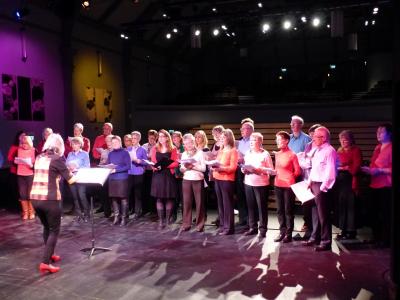
The Kaleidoscope Choir make no pretensions to being the ‘finished’ product. It’s not often an audience is invited to join the performers in their warm-up exercises, but as leader Carol Bowns explained, this was as much a workshop event as a concert; the emphasis was on having fun and on these terms it certainly succeeded.
In keeping with the United Reform Church setting, the choir entered with an Alleluia chant that initially had something of a Gregorian flavour before going off a slight tangent, reflecting its contemporary authorship. Looking resplendent in their multicoloured collection of tops they went from warm-ups through rounds, response and calls of increasing complexity and finally into 3-part harmonies. The earlier songs had the lyrics on overhead display with an open invite to the audience to join in. Then partway rhrough we were treated to a display of Peak District photos taken by Jacob, notably the youngest member of the choir and author of ‘Distant Peak, a gentle song (with shades of Ralph McTell) celebrating the scenery of the hills.
The workshop feel returned prior to embarking on the 3-parters; just like in a standard rehearsal each part was performed alone before joining them into a whole. Currently the choir membership is a little over-weighted towards the soprano side with the result that the central (alto?) part is a little lost when it is all joined together, but I’m sure with time and lots of hard work this will be rectified.
The concert closed with an enthusiastic rendition of the Flying Picket hit ‘Only You’ followed with a brief chorus of Handel’s Alleluia. Everyone looked like they were having fun and I include the audience in that.
Fred Rolland
DON GIOVANNI by Mozart - Opera Seria

After seeing the big budget Opera productions at the main festival, I wondered how Opera Seria were going to pull it off with their minimalist set and a piano instead of an orchestra. But as soon as James Williams and Don Giovanni and Darwin Leonard as Leporello came onstage I was engrossed in what felt like the fastest 90 minutes of the Fringe so far. When Robert John Edwards as the Commendatore returned to the stage to drag the Don to hell it felt like the production was over much too soon.
Let's face it, all of Mozart's opera plots are pretty daft and need to be played with tongue in cheek which this cast did to perfection. The production had been cut to 90 minutes and this may have helped to maintain the pace as the story was packed into the time available. The acting was lots of fun with all the cast giving lively and often comic stage performances.
The singing was superb. Katy Kelly as Donna Anna, Rochelle Hart as Donna Elvira and Helen Latham as Zerlina interpreted Mozart's arias beautifully. Don Giovanni and Leporello were excellent. Michael Doroszenko as Don Ottavio, Mark Gwynne as Masetto as well as Robert John Edwards all provided able support.
To my surpise I did not miss the orchestra. Jonathan Ellis's playing was perfect for this production and complemented the singers. Hats off to Jonathan and the Stage director Rochelle Hart for creating such an enjoyable production and allowing Mozart's sublime music to shine through.
This is the first Opera Seria production for the Fringe but I hope that they come back every year and show the main festival what can be achieved with lots of energy and talent.
Alex Watts
AN EVENING WITH AFRICA'S LADY OF SONG - Margaret Ferguson, acc. by Jonathan Ellis
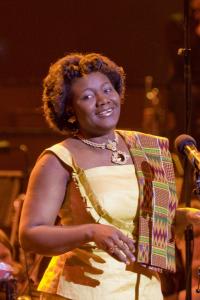
Buxton Methodist Church, 15th July
At some Fringe events you can just feel the love - and, emphatically, this was one of them. Simply it was a joy and a pleasure to be in Margaret's company and to hear her sing.
Margaret is an experienced performer and is quick to relax and to engage the audience. She has a charming, easy manner and though she has stories to tell she knows when to stop and start singing. And such singing!
Her programme drew heavily on opera which remains her first love with two Mozart arias at the heart of the first half. (Being colour blind and not all that fashion conscious I am not the best person to comment on Margaret's dresses but it is only right to acknowledge that she was stunning in light but rich blue for the first half and possibly lime green for the second). Anyway, back to the Mozart.
Un moto di gioja is from The Marriage of Figaro and is sung by a young woman looking forward to her wedding. Non temer amato bene is more usually heard in Idomeneo but Margaret chose a concert version for what she called the "serious stuff". "Be not afraid, my love, whatever life brings our way." This was stirring, controlled drama and Jonathan Ellis's sympathetic accompaniment was particularly evident in his careful observation of the dynamic markings.
There was more high drama in the conclusion to part one - Son qual nave by Broschi tells of a ship being blown off course in a storm into deep and dangerous waters.
Part two was rather lighter in mood but Margaret treats all songs seriously and respectfully so there is never a sense of casual frivolity.
I Have Confidence (from the Sound of Music) was charmingly delivered and The Alto's Lament (regretting the limited chorus roles whilst tenors and sopranos get the melody and the glory) was as entertaining as anything I have seen or heard all Fringe.
Quite different was Elgar's romantic and yearning Where Corals Lie. None of the earlier pyrotechnics but simple and graceful. The last item on the published programme was a modern setting of Psalm 27 - which offers consolation, hope and trust.
The audience demanded and got three encores. A love-filled evening - thank you Margaret and Jonathan.
Keith Savage
�
EXTRAORDINARY PEOPLE ORDINARY LIVES - Egriega
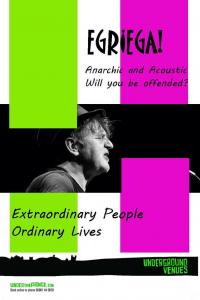
Underground Venues 7, 9 & 10 July
Egriega is just a duo: Peter Egriega sings and plays guitar and Steve Taylor accompanies on double bass. But what a life affirming noise they make!
Peter has been in music making for many years but following a stroke a few years ago he has had to reshape his life and his approach to music. His starting point is to recognise the fact that he has survived and that "If there is only one thing you do with your life, don't let go." There is a tremendous amount of positive energy in his playing and singing and he is an enthralling and intelligent story teller.
You'll want to know more about Lillian Gish's leg and the yarn about his Gibraltarian uncle, the monkey, the cursed diamond and the shark - and why that leaves you with reasons to be hopeful.
One of Peter's songs was offered to his daughter who is now a student; "I knew your father before he was a knob" he advises. In many ways that sums up his current approach - he doesn't take himself too seriously, certainly he is not precious about what he does, but he seeks to engage people in a way that they will be comfortable with.
"Like all songwriters," he begins casually, "I have a song about erectile dysfunction. But this one is different because it is about premature ejaculation too." He describes his songs as "catchy with a ribald world view" and to that extent they sit in a broad folk tradition, but his influences are far wider than that.
He says he loves the music of Louis Armstrong and that is evident in his vocal style; he has lived and worked through the Manchester post-punk era and that plain excitement and enthusiasm has left its mark on his music.
Peter and Steve are back on Saturday lunchtime. Hear them before going to the Carnival procession - the whole thing will be much more enjoyable that way.
Highly recommended.
Keith Savage �
FLUTE & PIANO RECITAL - Rachel Johnson & Jemima Palfreyman

Buxton Methodist Church, 14th July
Rachel and Jemima have established themselves as regulars in the Fringe diary and those of us that have heard them before are keen to renew that acquaintance. These young musicians are also delightful people who plainly get great pleasure from their music-making and this joy is readily shared with the audience.
For this recital they played two principal and contrasting pieces. I had not heard Schubert's Arpeggione Sonata arranged for flute before but it adapted perfectly. It was composed late in his life when he was already ill and prone to depression and the sonata reflects some mood changes. The opening Allegro appears rich in effortless flowing - exactly what you would expect of Schubert. The following Adagio is more brooding and insistent in mood - there is a sense of agitation before calm is restored. The final Allegretto has a melancholic air before leading to something more optimistic and outward looking.
Rachel has a clean, smooth technique and Jemima recognises that her role here is often supportive and she adapts her playing accordingly.
The Czech-born Bohuslav Martinu composed his Sonata for Flute in 1945 whilst living on Cape Cod. In his childhood the family lived in a church tower and he must have heard bells regularly so although he had long left Bohemia behind by the time he wrote this piece echoes of the bells remain.
In this Sonata there are times when the piano is much more forceful and its role is not always simply complementary. Frequently the music is unsettled and there is a sense that it is windblown and the notes are scurrying. This is less true of the central Adagio movement which almost creeps at first before before establishing itself as more confident. An introspective episode develops before the spell is broken by the return of the bells.
The programme was completed by two short pieces by Faure.
The applause was warm and sustained and properly recognised not only the pleasure given but also the hard work and practice that had made such complex and subtle music so accessible.
Keith Savage
�
HARP-HEARTED - Alice Kirwan - Harpist
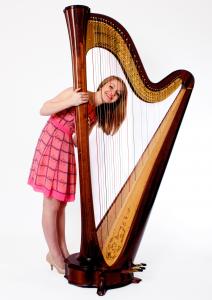
Alice Kirwan gave a tremendous performance playing her harp at Underground Venues on Sunday afternoon to an audience of 26.
Although most of the pieces were written in the 21st and 20th century the pieces showed a wide contrast in genres. This ranged from the gentle French impressionistic piece Berceuse by Marcel Tournier (1879-1951) to the more aggressive pieces such as Chamber of Horrors by Elene Kat –Chernin (1995).
I am sure all the audience were impressed with Alice’s technical mastery of the instrument and sensitivity of her playing. She conveyed very convincingly the different emotions in the music.
Alice avoided the temptation to play well- known pieces transcribed for the harp but concentrated on compositions written for the harp by harpist, some of them having achieved great international acclaim.
Alice gave a short talk about each piece which was useful as the composers were probably not well known to many members of the audience. She also explained and demonstrated special effects such as the lever slide and pitch bending. She also showed in her playing how the harp could make percussive effects.
My favourite was possibly the Exosphere and Scherzo Del Pueblo from Suite Galactique by Caroline Lizotte born in Quebec in 1969.You really do get a feeling of being moved outside the earth’s atmosphere.
The folk song influenced pieces (The Swan by Catriona McKay and Deoriacht Chalmciln by Michael Rooney) were also extremely beautiful and you felt as if you were on the boat sailing from Scotland or Ireland with sadness in your heart.
The audience left after experiencing the beauty of wonderful harp playing and being aware of the versatility of the instrument.
Roger Horvath
HATHAWAY – EIGHT ARIAS FOR A BARDIC LIFE - Helios Collective
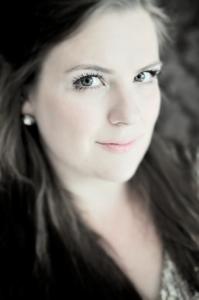
Pavilion Arts Centre, 19th July
One of the real bonuses of the closer working relationship that now exists between the Buxton Festival and the Festival Fringe is the fact that some Festival events also are part of the Fringe programme. This is one such event.
Soprano Elin Pritchard was a dazzling triumph at last year's Festival when she took the lead role in Lucia di Lammermoor. There was understandable excitement when we learned that she was returning to Buxton for this one-off musical drama which forms part of events that mark 400 years since the death of Shakespeare.
The premise here is simple: Shakespeare is dead and his widow contemplates life without him and then reflects on their years together. Their relationship was a long one and it was not without its problems and difficulties. Their story is told through a narrative written by Briar-Kit Esme which links eight arias that match Anne Hathaway's mood and emotional state.
Shakespeare is dead and Hathaway is distraught. She sings Purcell's O, let me forever weep (from The Fairy Queen). In time she recalls how they met as children before falling in love.
'Anne' sings Verdi's Sul fil d'un soffio estesio (from Falstaff). Anne was pregnant at the time of the wedding and it was not long before William left Stratford for London leaving Anne to cope with a young family. This is signalled by the aria La luce langue from Verdi's Macbeth.
Separation results in accusations of adultery and the Ave Maria (sung by Desdemona in Verdi's Otello) allows Anne to express sorrow on her part. Anne and William had a son, Hamnett, who died aged 11. His death understandably leaves Anne heartbroken and she is given La mort d'Ophelie from Berlioz's Tristia as a way of expressing that grief.
The loss of Hamnett drove further wedges between the couple and the least well-known aria in this programme - one given to Ophelia in Amboise Thomas' Hamlet is used. For the seventh scene Anne again considers whether or not she wants to live without William. An aria originally sung by Juliet in Gounod's Romeo et Juliette gives expression to her questioning.
Another Gounod aria - also given to Juliet - brings us to the conclusion. Anne feels able to live without William in the knowledge that his work gives him a certain immortality.
It should be evident from this summary that Elin had to tackle a considerable range in this performance and she did so with confidence and style. It goes without saying that she has a glorious voice but it also mattered that she conveyed Anne's happiness and despair.
She was splendidly accompanied by pianist Noah Mosley and both earned the warmest possible applause from an enthusiastic and moved audience.
Keith Savage
�
KEEP UP WITH THE JONESES - Will Hawthorne

Old Clubhouse, 18th July
I had such a lovely evening I think I am beyond writing a review. Having come straight from the Glummer Twins - who are really very good - I walked into the Old Clubhouse and immediately saw a whole bunch of people I haven't seen for a couple of years. Looking out of the Clubhouse windows the late evening sky was a deepening blue and a silvery full moon was painted onto it. Nothing could spoil this.
In fact Will Hawthorne and his band only added to the life-affirming nature of this Fringe day. Will is a hard-working Buxton musician - turning up in all sorts of places in all sorts of bands. Sometimes acoustic, sometimes electric. For the Fringe he always tries to put together a show that is a bit different. Last year's programme was film music from the 1960s and for tonight the songs all had a connection with someone called Jones - with a couple of cheats allowed.
The band kicked off with a good sing-along Ob-la-di, Ob-la-da which is about Desmond and Molly Jones, of course. This was swiftly followed by the Small Faces' Lazy Sunday (Gor blimey, Mrs Jones) and a Ray Davies song Next Door Neighbour (Mr Brown and Mr Smith also figuring for good measure). The Grateful Dead's Casey Jones (Driving that train, high on cocaine) concluded a brief tour of some of the giants of 20th century rock music.
Then came a couple of bits of sleight of hand; Delilah was sung by Tom Jones, of course, and Space Oddity and The Man Who Sold The World were written by a chap called David Jones. Before we knew it Deacon Jones had brought the first half to an enjoyable end.
The second half began with Will on his own and an acoustic guitar singing a clutch of what I take to be original songs (including one from his underpriced CD). He played Who do you think you are kidding Mr Hitler? and we sang the song unbidden.
Will then swapped to a different electric guitar and the band rejoined him for the Bee Gees New York Mining Disaster 1941 and Have you met Miss Jones? (the only version you need refer to is the Sinatra one). One of the highlights of the evening was Me and Mrs Jones which Billy Paul is best remembered for. Miss Amanda Jones comes from the Rolling Stones Between the Buttons album of 1967 and Down In The Tube Station At Midnight by The Jam comes from a different era.
An agreeable bit of cheating allowed for the retitled Hendrix classic Hey Jones - agreeable because it featured Will's best guitar work. Janie Jones - one of the great punk-era songs - closed the set. There was just time for an encore - Waiting for the man (Mr Jones presumably).
Will was well-served by his band: Matthew on rhythm guitar, Nigel on bass and Eric on drums who stepped in at six days notice. This was a "one-off" - given the work that went into it surely a repeat is called for?
Keith Savage
LOCAL MUSICIANS' SHOWCASE CONCERT - Club Acoustic

First of the four acts in the Showcase at 'Club Acoustic' was Joe Ramsey, lively young guitarist playing semi-acoustic guitar in jazz-folk finger-plucking style. With Daryl Hall hair and a trebly early Sixties sounding voice replete with vibrato and a fetchingly weak 'R', he did admirable covers of Leonard Cohen's 'Hey that's no way to say goodbye', 'Hallelujah I Love Her So' by Ray Charles, and best of all, Bob Dylan's 'Boots of Spanish Leather'.
High-point of the evening was undoubtedly comic balladeer, Jolly Jock, wearing a white seaman's cap, jester's trousers and a shaggy beard, and playing ukelele and trombone. In a dazzling display of old-time entertainment, the rubber-faced surrealist recited half a dozen music-hall ballads, all from memory. 'I Love Bananas', 'Glue Sniffing', 'A Noisy Noise Annoys An Oyster', and the poignant polar bear song, 'Have You Got Any News Of The Iceberg?' amused a delighted audience. His patter between songs was the well-worked-out routine of a seasoned lifelong performer, but the best joke of the evening was probably not an original: 'I was a glue-sniffer once. I became addicted to Tippex and was placed in a house of correction, but I'm all white now.' He warned the crowd that he had 'terminus' cancer but was lucky that his disease produced an excess of serotonin, so he was dying of happiness, and intended to share it around. He certainly did that, with a rousing show that was the liveliest, cheeriest part of the evening. Even his version of 'Sisters of Mercy' (Leonard Cohen meets Lonnie Donegan) was chirpy and poignant, as Jock asked for donations to a local hospice.
Singer Esther Brennan apologised for bringing yet another 'happy death' song to the folky crowd, but no one seemed to mind. Her white-bearded accompanist Ian Buchanan, played dobro, waltz zither, mandolin and guitar, and sang harmonies with tall, dreadlocked Esther, who played glockenspiel and seemed born to cover Iris DeMent's 'Our Town'.
In a restful interlude, amusingly-titled quartet 'Simply Lay Back' played green guitar, oboe, box drum and recorder and gave an ambling jam-session at half-time.
The night ended with a dozen musicians joining Django Reinhardt-style guitarist, John McGrother on stage for a group singalong.
Jonathan Mallalieu
MEGA-BLOCK - Manchester Recorder Orchestra
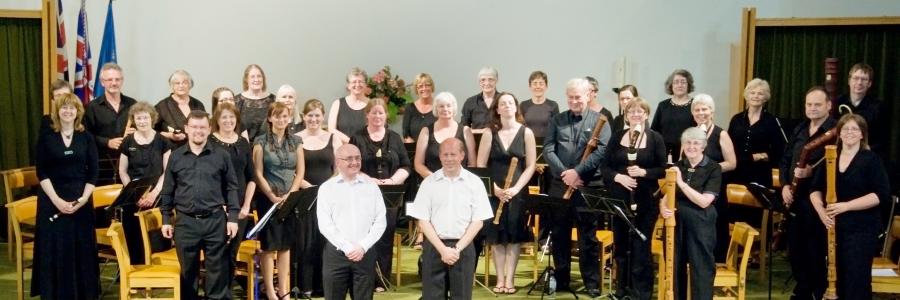
For those who conjure up a picture of tortured parents and howling dogs when they hear the word “recorder”, last night's performance of the Manchester Recorder Orchestra at the Buxton Community Church would have been a revelation. The Orchestra is well known to regulars of the Fringe, this being their 17th year and so, as might be expected, they were greeted with warm and appreciative applause from the outset. The Orchestra was established 35 years ago in 1981 by Dennis Bamforth and is said to be the first Recorder Orchestra, certainly in the UK, so I think it's now almost heading for Venerable status as the Elder Statesman of Recorder Orchestras. However, it's still a vibrant and lively collection which belies its long heritage.
It was really good to see such a range of ages in the orchestra, starting with the early teens and moving through to the established and experienced players who've been with the Orchestra from its inception. I should also say that, even if you think recorder music isn't for you, go along next time you have a chance to hear this Orchestra. They have real talent but also some very unusual instruments, ranging from the tiny 8 inch sopranino to the astonishing contrabasses of around 7 feet tall. Even bigger is the sub-great bass, which looks more like a cubist sculpture than an instrument. This great beast is impressive in its own right but it's only one of three in the UK, and the only one of its kind in the North West.
Conducting was divided between Ian Chester and David Walsh in two halves of varied pieces. Ian conducted the first half, opening with music familiar to many – an extract from Rossini's 1813 opera, L'Italiana in Algeri (An Italian Girl In Italy), including some delicate playing from the sopranino, the smallest of the recorders. This was followed by a very accessible modern piece, Mega-RONY by Pete Rose, a jazzy 3 movement piece, portraying the day in someone's life, beginning with waking in the morning to a gloriously percussive and exuberant Evening Celebration. The first half concluded with Triple Concerto by Steve Marshall, a lively piece, again in 3 movements, but this time featuring soloists, Sarah Langdon, Kirsty MacDonald and David Walsh (also the conductor of the second half of the concert). These three interweaved the melodies beautifully, changing the mood from gentle, through hypnotic, to a jaunty, up tempo finale.
Then a break for drinks, cake and relaxed chatting, before the concert resumed under the baton of David Walsh, with Symphony No. 4 Op.45, written by the Orchestra's founder, David Bamforth. This piece is known as The Gimmick, because each of its 5 movements has a particular quirk ranging from the first movement entitled Five Beats, which David confessed was “a pig to count”, and ending with the fifth movement, Three Bar Phrases. The mood changed to become more pastoral with the next piece, another favourite of many, Malcolm Arnold's Cornish Dances Op. 91. You may think you don't know this but check it out. You almost certainly do. The orchestra certainly did justice to this lovely piece. The concert ended with another modern piece, BLOCKOUT by David Moses. This has been described as “big band jazz for recorder orchestra”. What a way to end the evening!
I had a great time, reminding myself of the richness of music available to the “humble” recorder, and the wonderful sounds which well conducted, well rehearsed and talented players can make. Catch them if you get the chance, although this may have to be next year if they decide to make it their 18th appearance perhaps?�
Judith Somerwill.
NINE CHAMBER MUSICIANS ENTERTAIN - Cheshire Chamber Collective
Members of Cheshire Chamber Collective played four works at the Methodist Church to an audience of about thirty five. The first and last works were nonets by Louise Farrenc (1804 – 1875) and Bohuslav Martini (1890 – 1959). In the middle of these two nonets the audience heard Early Hungarian Dances for Wind Quintet by Ference Farkas (1905 -2000) and Shakespearean Sketches for String Trio by Gordon Jacob (1895 – 1984).
The nine musicians made first class performances of these works. They produced a clear sound and individual soloists showed empathy with each other as for example in the 2nd movement of the Ferrenc’s piece when the melody was passed around to individual soloists. They played with strong rhythmic control as in the Early Hungarian Dances. They brought out the energy and vitality in the music nowhere better demonstrated than in the Martinu. Farrenc did not give much opportunity for the wind players to get their breath back and deserved a well earned early interval.
I had not known of the music of Farrenc before this festival and I am excited about it. We were told that during her time she had quite a reputation as a composer and worked as a professor for thirty years. From her music you would guess that she was familiar with Beethoven, Schubert, Mendelssohn and Schumann but I could detect little influence by any of these composers. The only similarity was what naturally comes with being contemporary. There was something of a fresh, open air feeling about the music. Something new! Rather a strange thing to say nearly 150 years after her death. To me she seemed to be looking out of herself rather being introspective like several of her contemporaries. I loved the oboe solo in the 2nd movement. The scherzo is amazing with its pizzicato on the strings answered by the woodwind and creative ideas following one another in rapid succession.
The Farkas showed how the music in early times in Hungary was not all that different from that in England. Farkas used old music he found written in tablature form and added his own style to them with distinctive Hungarian touches.
Gordon Jacobs sounded very English with beautiful folk song - like melodies throughout. His music interpretation of some of Shakespeare’s lines was convincing.
Martinu’s work was written just before he died. Martinu’s music has gone through a lot of phases. There was something beautiful about his lyrical moments. The performers generated a feeling of excitement in the outer movements which at times reminded me of Stravinsky and I kept on thinking about Nielsen’s woodwind quintet. Some of Martinu’s music has earned him the title of the Czech Stravinsky. I rate Martinu's music very highly mainly for his string quartets and his short piano pieces but this piece did not disappoint me.
Roger Horvath
ORCHESTRAL CONCERT - High Peak Orchestra
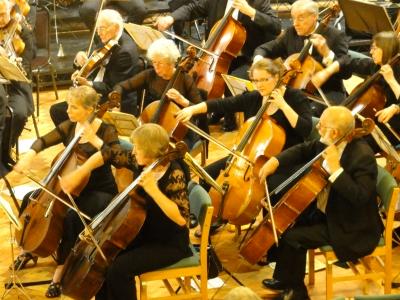
St John’s Church 10 july 2016
The High Peak Orchestra is a welcome regular event on the Buxton Fringe, and this year’s concert marked a special date in the orchestra’s history. Andrew Hodkinson, their conductor for many years, retires from the podium, though he’ll still play in the viola section sometimes, so his (large) personality will continue to be felt. He was emphatically applauded, especially by the orchestra, and presented with a cheque and a miniature tree with an elegantly corkscrewed trunk – was this significant? The search for his successor is currently under way.
The concert in St John’s church began with Walton’s Orb and Sceptre overture, composed for the Queen’s coronation in 1953. This is an extrovert salute to a nationally upbeat moment, and went with verve and enthusiasm, with just occasional hints of a possible runaway train.
This was followed by Tchaikovsky’s Orchestral Suite No 1, a work not very regularly performed, and evidently challenging, as well as satisfying to hear. It is full of signature Tchaikovsky harmonies and tunes, with moments, for instance when a trio of flutes are lilting delightfully, when you really feel that a corps de ballet should be appearing stage left. By way of contrast, there are darker moments too, and a crisp fugue that is more 18th than 19th century in feel and orchestration.
The final piece was Dvorak’s Symphony No 8, a cheerful and optimistic work, with lyrical music lyrically played, full of echoes of the Bohemian folk music that Dvorak loved. The rousing f first movement was particularly enjoyable to watch as well as hear, as was the finale, when every instrument was fully engaged and the effect was tremendous. In between, there is much gentler music, giving particular scope for the strings and woodwind to show their winning qualities, which they did excellently.
Music lovers now have endless opportunities to listen to performances of whatever they fancy, played by the world’s greatest musicians, whenever they happen to feel like it, which is a pleasure unimaginable to Tchaikovsky or Dvorak. But being present at live music-making is a truly different thing. Over at the Festival, there are some of the best professional performers to be heard, but the perhaps humbler performers on the Fringe are mainly amateurs, literally doing it for the love of it. This shines through to the listeners as well.
If you missed the High Peak Orchestra this year, mark it down for next – they’ll be back.
Ursula Birkett
PARTITA: EARLY MUSIC CONCERTS - Partita
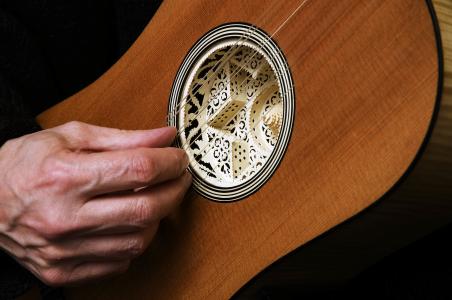
St John's Church 13th July
What a rich and varied feast we were offered by Partita and Stringboxes - it is hard to know where to begin.
Partita have been coming to Buxton for over twenty years and so many will be familiar with the repertoire they bring but every year they find something new for our delight. The music of lutenist Andrea Falconiero (c1585-1656) is not exactly unknown but is rarely heard. I suppose that Roger Child of Partita may have been introduced to Falconiero through the Italian ensemble L'Arpeggiata. Anyway over the course of the evening we heard a selection of his pieces which seemed characterised by a certain elegance and stateliness.
Apart from their collective musicianship Partita are blessed with the glorious voices of Sasha Johnson Manning (soprano) and Holly Marland (mezzo). They combined beautifully in Purcell's My dearest, my fairest and Store away your happy hours. Holly had the opportunity to shine in two Italian songs; Folle e ben chi si crede and Monteverdi's lament Amor, dov'e la fe. The translation of the Monteverdi text is hardly necessary - so evident is the heartbreak in Holly's voice.
Roger Child plays an array of instruments including the lute, theorbo, viol, guitars and vihuela. Partita can also rely on Jill Lingard (harpsichord) and Margaret Walker (harp) and the recorders of Sasha and Holly to add to the texture of the music and that was especially important for the Falconiero dance tunes.
The rest of the evening was given over to the duo Stringboxes who first played in Buxton last year. Stringboxes are Holly Marland (kora) and Michael Cretu (double bass). Holly is still learning the kora and makes regular trips to the Gambia to study and deepen her knowledge of the instrument and its place in West African culture. The kora is a 21-stringed instrument that looks a bit like the lute but is played more like a harp.
Michael and Holly played some evocative and enthralling West African songs and she also played some brief sketches that she had worked on whilst visiting the Hebridean Island of Eigg very recently. Michael then gave the world premiere of a short double bass sonata that he had composed. Michael was born in Bucharest and The Lost Country is an exploration of the ancient relationship between Transylvanian village songs and travelling Roma musicians.
To conclude the evening Partita and Stringboxes joined forces for further exploration of the music of Falconiero and other Spanish and Italian music. This was an evening that was pleasurable, moving and stimulating. The Buxton Festival Fringe is fortunate to count Partita and Stringboxes among its friends. We hope that friendship endures for many years yet.
(Partita also perform at Buxton Methodist Church on 22nd July at 1pm).
Keith Savage
PEAK DISTRICT STRING ORCHESTRA AND WIND BAND - Peak District Music Centres
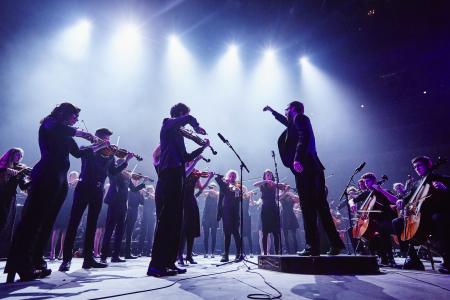
St John's Church 8 July
The end of the school year is not the best time to produce a student performance. Some are involved in proms, others have finished exams and 'disappeared'. So numbers for tonight's performance were slightly reduced and it was fair to say that there was a bit of reshuffling of the programme to accommodate the available forces. Have no fear though all the young players did the Peak District Music Centres and themselves proud.
For the first half of the evening it was the chance of the Wind Band to shine. They began with some themes by Maurice Jarre for the film of Lawrence of Arabia and the drums thundered dramatically across the imaginary desert. Other selections included excerpts from the Nutcracker Suite, Oliver and Bizet's late ballet L'Arlesienne. They finished the first half with the cheering and witty Chicken Run. The Band, given decisive direction by Gareth Widdowson, plays with confidence and purpose; tempo and dynamics are carefully observed and managed, transitions are smooth and the brass section came across brightly.
The Band has a good future.
The Band took a break midway through the first half and we were treated to some violin duets by Rebecca and Katie Marrow who are playing at a major Music for Youth event in Birmingham over the weekend. They played an adaptation of a Dowland lute tune, a difficult and elusive piece by Honegger that seeped reluctantly into existence, a cheery and melodic piece by the youthful Suk and, best of all, three folk tunes arranged by Bartok.
After the interval the String Orchestra played three pieces that it will perform on a short tour of Normandy in August. It was a profoundly moving experience for a number of reasons.
Ian Naylor has been the energetic and inspiring director of the Orchestra but he is moving on after the tour. The second piece was Barber's Adagio for Strings - a piece Ian had taken to a festival organised in the Spanish Alpujarras by his own cello teacher Cat Jary with a previous incarnation of the Orchestra. Cat died aged 46 a little over a week ago. Ian dedicated the performance to her memory and it was received, suitably, in respectful silence. Quite how young musicians play with such maturity and depth of feeling is hard to imagine.
Their collective skill and maturity was also evident in an account of Britten's Simple Symphony in which the Sarabande was outstanding. The Orchestra began with five movements from Handel's Concerto Grosso Opera 6 no 5. As Ian observed to spontaneous applause, Handel was a European who worked in England enriching us all. The playing reminded us - as if it was necessary - what a thrilling and evocative writer for strings he was. The Orchestra is well-led by Ewan Kilpatrick, the second violins by Katie Marrow and the cellos by Joss Spear.
The Peak District Music Centres are an important part of what is available to young people in this area. Pressures on teenagers in school and elsewhere sometimes squeeze the time-consuming business of music-making but it can such a source of pride and achievement. Please support it in any way that you can.
Keith Savage
�
PIANO RECITAL - Jonathan Ellis
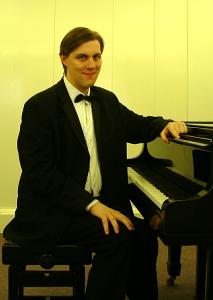
Buxton Methodist Church, 22nd July
By the end of this Fringe Jonathan Ellis will have played at five different events - two of them today. Just 90 minutes separating the end of his accompanying Opera Seria in Don Giovanni and the start of his own taxing solo recital. His appetite for music-making seems to be insatiable.
Tonight Bach, Beethoven and Brahms were at the heart of his programme and he played three major pieces from memory (and more besides!) Bach's Partita No 2 in C minor was, of course, written for harpsichord but is now usually played on the piano. Jonathan's tempi are on the brisk side I think and I am not sure that this served Bach ideally.
There were no such reservations about the rest of the evening. Beethoven's Sonata Op. 28 "Pastoral" closed the first half and was totally absorbing. The second half began by pieces by Bartok and Bax - music written for pianist Harriet Cohen coincidentally. (Cohen was Bax's lover for many years).
Jonathan apologised for having to use the sheet music for Bartok's fiendishly difficult six dances in Bulgarian rhythms - remind me never to attempt to dance with a Bulgarian! Sleepy-Head and Nereid by Bax were impressionistic in style - think Debussy - and an agreeable place to pause before the high drama of the final piece.
Brahms' Sonata No 2 is great Romantic music and perhaps suits Jonathan's temperament best of all. The 27 minutes or so passed easily - so totally engaging was the playing. The audience (and Jonathan) insisted on two encores - Beethoven and Brahms - and then all had their appetites met.
Keith Savage
�
SEASONS OF SONG - Ladybrook Singers with Chapel High School Choir
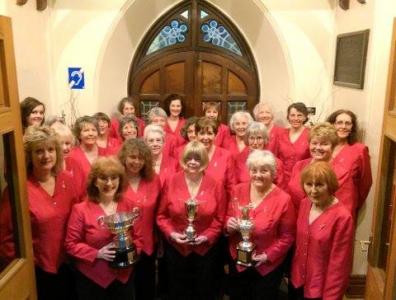
From the start I have to confess I approach this review not as a musician but as a lover of music. That said I loved what I experienced this evening in the stunning setting of St John’s Church.
The Ladybrook Singers are a well-established choir. They celebrated their 80th Anniversary in 2008. Since May 2009 Alison Bletcher has been their Musical Director. Chapel High School choir are a new group comprising of students ranging in age from 11-15. Their experiences are worlds apart. Ladybrook Singers have toured, most recently in Holland, and have won many awards. Some of Chapel choir have sung in the Carol concert and others have taken part in the school musical.
The Ladybrook Singers are a highly skilled group who have the capacity to move the audience to tears with their beautiful blend of voices. Bring Him Home (Les Miserables) and The Snow (Elgar) were both perfect examples of the power that music can have on an audience. Nicola Halford accompanied The Snow on flute. The quality of the sound in the setting of the church was beautiful.
Chapel High school choir are a mixed gender choir ranging in age from 11 to 15. They have been put together by the enthusiastic and motivational Andrea Wright (The Head of Music at Chapel High School) ably assisted by Zoey Vickers and Sarah Ledbury. The warmth and enthusiastic personality of Andrea Wright made the audience feel relaxed and ensured the students were fully engaged at all times.
You Raise Me up sung by Hannah Lomas, Rosie Stables and Lauren George of Chapel Choir moved me to tears. It was pure, intense and honest. The audience commented on the strength and maturity of the voices.
The section from Les Miserables was wonderful. The youth section brought life and character to the pieces whereas the Ladybrook singers brought their vocal skill and experience. The audience visibly enjoyed the drama of this section. There was a guest appearance by Samuel Higginbottom confidently singing Master of The House. The young Chloe Mallet captured the character and quality of Corvette in Castle on a Cloud and Pat Brindley sang On My Own wonderfully.
Fun was had in the lyrics of Sweet Waters of the Tyne and with Alison demonstrating what the smallest recorder sounded like.
A huge mention has to go to Celia Mayor the piano accompanist who had worked so hard for the entire evening.
As Alison Bletcher said the addition of Chapel School Choir brought the average age down considerably. I heard one elderly audience member say that it was lovely to see boys in the group. I agree. This was a wonderful evening full of talent, emotion and musical hope for the future.
Jayne Marling
SHAKESPEARE AND ALL THAT JAZZ - Les Trois Amies
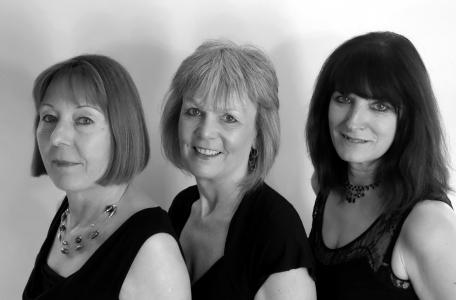
As we all know by now Shakespeare died 400 years ago. He lived only in England.
Jazz - one of the 20th century's great legacies was created in America about 100 years ago. Shakespeare and jazz are not obviously connected. But Les Trois Amies presented a thoughtful and coherent programme of music composed in the 20th century.
Les Trois Amies are pianists Marianne Kelly and Heather Sargeson - who duet on a single keyboard - and soprano Carol Bowns. The programme began with three piano pieces by Constant Lambert who achieved some success in his 20s but Trois pieces negres pour les touches blanches were written near the end of his short life. (Short-lived composers was something of a sub-theme tonight). The music clearly owed something to the innovations of jazz as well as other jazz-influenced composers such as Stravinsky.
Then came the first three songs - written by English composers using Shakespeare's verse. Vaughan Williams - who was unaffected by jazz so far as I know - set Orpheus with his lute from Henry VIII. Less familiar were Humphrey Proctor-Gregg's I know a bank where the wild thyme blows and Madeleine Dring's The Cuckoo from Love's Labour's Lost. These are difficult settings and Carol's interpretations were warmly received.
Peter Warlock did not live a happy life and it is supposed that he ended it when just 36. His influences included Italian 16th century composer Gesualdo as well as jazz. Knowing something of his personal unhappiness it is tempting to read meaning into his music that maybe isn't there. His Capriol Suite was engaging music for piano duet.
Three 'Shakespeare' songs by American composers followed. Desdemona's Song by Korngold - who settled in the States in 1938 - Take, O take those lips away by Amy Beach and finally One hand, one heart from West Side Story (which was an excusable bit of cheating).
That left time for one final, triumphant piano duet. Gershwin died aged 38 but left some great music behind. Rhapsody in Blue sounded undiminished played by four hands on one piano. Witty, warm and with rollicking melodies it is always a joy to hear and it seemed that Marianne and Heather got satisfaction and pleasure in playing it for us.
That left time for one urgently demanded encore Transatlantic Lullaby which was a 'hit' for Geoffrey Wright in 1940.
All-in-all a most satisfying recital of music that should be heard more often.
Keith Savage
SKETCH BOOK...AND OTHER TALES - Rebecca De Winter

Rebecca De Winter tells stories in music. She played the Green Man Gallery with her band comprising Nicola Solesbury on violin, Dave Copperwheat on accoustic guitar/vocals and Dan Mcgrath on base, vocals, harmonica and percussion. Rebecca herself plays piano, flute and percussion as well as vocals.
The band started their set with an instrumental "Goldings" about their local hardware shop. "Shy Bride" is about the singer's namesake from the Dapne Du Maurier tale. Apparently this has a youtube video featuring Scriveners bookshop. The subject of "Roots and Weeds" is fighting back against put downs and features the flute.
Several songs tell stories from Rebecca's home town of Kempston. "Not at the races" is a story about a lady in her late 60s who dresses in Edwardian clothing when walking around town. It is a pity that lady did not join the band for their trip to Buxton because she would fit in in so many ways. "A stitch in time" is about a decaying tailor shop window left as a memorial to the owners father. "Green Lady" is about a local ghost who appears on the banks of the river Ouse to scare bell ringers.
The band have an album and an EP available. The EP includes "Not at the races" and also "Raised Gun" about shooting in the USA and "La Mouette" which describes the dilemma of whether to stay with a rich husband or run away with a French pirate.
Each of Rebecca's songs has an very individual musical style which evokes the story as much as the lyric does. This is most marked on "Not at the races" and "La Mouette". The instrumental "Rain" uses backing from a 78 gramophone record and evokes every story that has ever been advanced or held back when the rain arrives.
It is still possible to catch Rebecca and band playing on top of the Buxton pump house at 2.25 Sunday 24th July.
Alex Watts
SOMETHING FOR EVERYONE - Voci
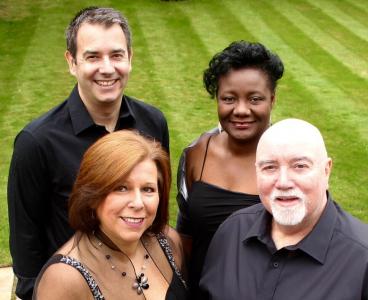
Buxton Methodist Church July 12th
Voci was formed just 18 months ago but is made up of four experienced singers who met through their involvement with City of Manchester Opera (which performs as part of the Fringe on July 23rd). The quartet arrived in Manchester by rather different routes. Of the sopranos Elizabeth Ambrose was born in Poland and Margaret Ferguson in Ghana. Tenor Eric Cymbir was born in Scotland and worked in New Zealand and baritone Simon Horsfield made the more straightforward journey from Blackburn.
The programme was largely made up of music from the 19th and 20th centuries and much of it was familiar and well known from sacred, opera and show repertoires. This made for an accessible hour of song but there is always the slight risk that comparison will be made with other, favourite versions.
Wisely, Voci approach the material in a simple, direct manner without unnecessary flourishes. Their approach is to put the music first. The programme got off to a friendly start with Everything's Coming Up Roses which gave us a chance to meet the singers and to hear their voices singly and collectively. Then followed pieces by two composers happily still with us. Ennio Morricone is better known for his spaghetti western themes, but he also composed the tender and elegant Bella Fantasia for The Mission. For some of us Sir Karl Jenkins is best remembered as a jazz oboeist and mainstay of Soft Machine. He has always had a good ear for attractive harmonies and melodies and this was evident in his Ave Verum.
Rossini's Sancta mater, Istud agas presented the quartet with greater technical challenges but the various solo and duet parts were handled confidently and fluently.
Selections from Gershwin confirmed what a wonderful composer he was. Summertime was nicely led by Elizabeth with a sprightly jazz-inflected middle section before a return to the more usual lullaby.
The world of (lightish) opera was well-represented by selections from Mozart, Offenbach, Bizet, Delibes, Strauss and Lehar. Voci were accompanied throughout by pianist Jonathan Ellis. Anyone who has heard Jonathan's solo recitals will know what a powerful player he can be, but he exercised great restraint in providing clear and appropriate support.
All-in-all this was a most enjoyable lunchtime recital with an attractive programme well performed. The enthusiastic audience would, I am sure, join me in hoping that we hear Voci in Buxton again.
Keith Savage
THE SOVEREIGN SAXOPHONE OCTET IN CONCERT - Sovereign Saxophone Octet
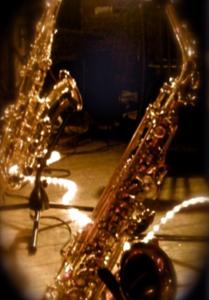
The Sovereign Saxophone Octet made a welcome return to Buxton Fringe presenting an enjoyable evening of music exploring a broad spectrum of tasteful arrangements demonstrating their versatility and super technique. On soprano sax Helen Southall and Gordon Robson, alto Caroline Brennan and Dave Webber, tenor John Boyer and Mike Dale and on baritone Stephen Hutchinson and Dorothea Livesay.
The concert at the acoustically favourable Methodists Church had a crisp start with Gordon Robson’s arrangement entitled African Waltz. With echoes of Mancini’s film music Baby Elephant Walk there was something for everyone in an uplifting performance, suitably energized to herald the musical variety in store. In a sweeter pastoral mode for Alan Cook’s arrangement of JS Bach’s ‘Sheep may safely graze’ the Octet produced some rich full chords in the chorale sections. The group had a sympathetic balance and tight tuning especially in some of the “danger zones” for the low pitched instruments. Who needs the King of Instruments with thousands of pipes when we can be seduced by the expressive tones of 8 saxes?
On to Jelly Roll Morton’s The Pearls recorded in 1926 and an earlier jazz number, WC Handy’s Beale St Blues. The Octet captured the ragtime era admirably with precise articulation, smooth triplets from the sopranos and the characteristic rhythmic pulse underpinned by the baritones.
The canzona ‘La Padovana’ by Ludovico Grossi da Viadana from the flourishing artistic hub of northern Italy of 1600 provided a baroque feel. The octet split themselves into 2 quartets emulating the then innovative choral settings of the early Renaissance and in this arrangement the “choirs” conversed across the stage with a skillful balance. The arrangement modernised the genre somewhat employing a few more passing notes and syncopation than one hears from most early music purists. A refreshing interpretation of this baroque love song which would have seemed a bit stilted as performed in 17th century, if only the saxophone would have been invented then the Venetians would have had a much better show.
Elgar’s Nimrod was played with sensitive expression from the middle parts supporting the clear positive tone of Helen’s soprano soaring above. An interesting Sax Octet arrangement of JS Bach’s Wachet Auf again updating the baroque genre and developing the piece in a very pleasing direction. After a cool statement from the alto with the ground bass line maintained, the arrangement quickly becomes quite busy with fugue-like entries from other parts resulting in a complex feel to the chorale tastefully overseen by the soprano. JSB himself was a notorious improviser and adapter and would have approved heartily of the Octet’s interpretation.
The rhythm for ‘Carnival’ set by baritones and tenors was reminiscent of Stevie Wonder’s Masterblaster. The altos are caught in the offbeat leading to something of a free-for-all which was expertly negotiated by the group. This was not an easy piece for the casual listener to analyse in detail, seemingly moving in all directions though it all fell into place and created a most congenial atmosphere as if effortless. Mike Dale played an impressive section which was either imaginatively improvised or expertly articulated from a fiendishly difficult score.
The story goes that in 1927 Shostakovich won 100 roubles in a bet that he would re-orchestrate the showtime hit ‘Tea for Two’ after a single hearing from memory. The result was his version named ‘Tahiti Trot’, subsequently re-arranged for the Octet (for a few less roubles) by Gordon Robson. The band pulled out all the necessary expression, louds, softs, swells, hits and diminuendi. There was creditable communication down the line of players who gave it the Latin feel and the audience approached the interval humming the tune in the refreshment queue.
O Magnum Mysterium by Gabrielli took us back to the baroque and another double quartet. Producing a more authentic ancient music feel in contrast to the contemporary music to come.
The premiere of Mike Dale’s composition, ‘Building Blocks’ sounded like a difficult piece to play with intricate turns and keys. But the Octet was certainly not phased, demonstrating the full range of tone colours in the pallette. The effect was brilliant and I expect that this will enter the standard repertoire for sax ensembles and more probably as a test piece for exam syllabuses!
Next up, a couple of numbers associated with the post war big band scene. Neal Hefti’s ‘Lil’ Darlin’’ often linked with pianist Red Garland from 1959, was given a slow sleazy treatment by the Octet. The coarse baritone sound and exaggerated wha wha from the alto solo demonstrated yet another voicing from this versatile group. ‘Take Five’ by the unique alto player Paul Desmond and inseparable from Dave Brubeck’s band is both ubiquitous and probably one of the few, if not the only 5/4 piece that has so far stood the test of time. The Octet seemed to pull out of the hat some entertaining variations using the entrancing interplay between altos and sopranos, throwing the catchy rhythm around the band. The result sounded a complicated melé but was very convincing, well executed, timing consistent and refreshingly different to most performances one hears.
Composer Astor Piazzolla, prodigious exponent of the bandoneon and associated in addition to composing with promoting the Nuevo Tango movement which allegedly takes its former origins from the seamy establishments of Buenos Aires. The Octet did justice to a slow version of the popular ‘Oblivion’. The rich chords and constant dischord/ concord changes created by gradually altering single notes in successive chords, thus implying and anticipating the next, give this type of music wonderful depth and a mysterious feel. The haunting melody was given ethereal quality by the clear tone at the upper register of the soprano.
‘Witch Hunt’, a piece arranged by saxophonist Nigel Wood is arguably a piece designed to appeal to saxophonists, full of syncopated rhythms and opportunities for technical exploration which the musicians tonight approached with aplomb. Quite a blast to end the programme and sounded very accomplished indeed though the work itself was looking for direction in my humble opinion.
The encore piece was a lovely arrangement of Moon River, milking the sweet tones, rich chords and interweaving themes amongst the instruments, which this group do so well. As with their other ballad numbers the nuances of expression such as leaning on the anacrusi was highly effective and the Octet achieved the difficult task of feeling the music together to send us home with a delightfully warm experience.
In conclusion the audience were as promised, treated to a broad variety of pieces from the Sovereign Saxophone Octet. The members are clearly technically masters of their instruments individually and play together beautifully, interacting to achieve a glorious depth and range of tone and colour. We look forward to hearing them again.
Brian K W Lightowler
SPIES, STORIES AND SONGS - Cold War Music
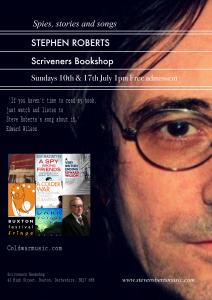
Scrivener’s bookshop was a good venue for this performance with its old books and ghostly atmosphere.
Stephen Roberts sang a number of songs that were related to the cold war. He referred to several spy books which one way or another have inspired him to write songs. The audience of 11 listened very attentively as the themes developed. Some people who were visitors to the book shop hung about in the next room to listen. The quality of the performance had drawn them in.
He developed many interesting concepts. In one song he explores the distinction between the public and private side of a person. Spies lose their humanity but so do many ordinary people who do jobs they don’t like which may involve saying things in public which their private person does not believe. Surveillance is very much part of a spies world but he asks the question is it not a part of ordinary peoples’ worlds where we are increasingly watching each other.
He sang several songs introducing them by referring to several books. The book ‘Dark Voyage’ by Alan Furst is the book which is the most important in moulding the show but there are many other authors and books which played an important part such as ‘A Very British Ending’ by Edward Wilson. In this book the author uncovers a plot to overthrow Harold Wilson.
In the first songs Stephen accompanied himself on the keyboard. Typically he played chords with his right hand whilst he played spooky or sinister bass line with his left hand. He sang expressively with commitment and the audience would have remembered the dark and dangerous days of the cold war. Afterwards he accompanied himself on the guitar before returning to the keyboard again.
The song ‘This is a Cold War ‘is my favourite song. It has a catchy melody which summed up the main theme.
I would recommend you go to the next performance. Go early because there is limited room and I guess the people in the audience will be talking to their friends about it.
I have in the past neglected the cold war genre but I certainly will be reading some of the books mentioned in the show. Thanks Stephen for this interesting show!
Roger Horvath
SUMMER GUITAR MUSIC: FROM RODRIGO TO DJANGO - Ed Billingham
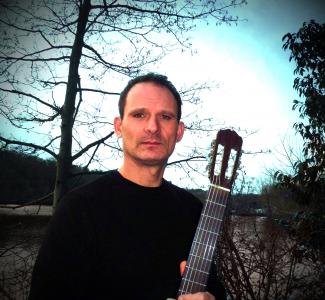
Burbage Institute,17th July
Ed Billingham has been working in Yorkshire for the last couple of years and so we have missed him at the Buxton Fringe but he is back in the north west and let us hope for our sake that he is here to stay. With him tonight was his new guitar and Jo Wade, who joined him for some guitar duets in the second half of the programme.
Ed's guitar is the work of a Romanian maker and is based on some of the innovations of celebrated Australian luthier Greg Smallman. Whilst it looks very much like the traditional Spanish guitar it produces a louder sound which is said to be closer to that of the human voice.
Ed's programme included much that is at the heart of the guitar repertoire. Central to the first half were two of the great pieces for solo guitar. The prolific Brazilian composer Villa-Lobos wrote six preludes in 1940 of which five survive. They were inspired by the great master Andres Segovia and so it is unsurprising that the language is 'Spanish'.
Segovia also transcribed Bach's Violin Partita no 2. This is one of the great pieces of music and is a landmark in human artistic achievement; for some it lends itself better to guitar. Technically this is an intense and demanding piece and Ed chose to close the first half with something less complex.
Tarrega's Recuerdos de la Alhambra is well-known and at times it sounds as if it is a duet. It begins in a melancholic way but a key change from minor to major lifts our spirits.
The second half of the programme was made up of mostly shorter pieces that sustained the happier mood of the conclusion to the first part. The contemporary French composer Roland Dyens has written Tango En Skai and arranged Django Reinhardt's Nuages and this was how Ed began part two. Torroba's Fandango - made famous by Segovia - also featured before Jo Wade joined Ed for some duets.
They played Albeniz's Bajo la Palmera, Carulli's attractive Rondo in G and, for an encore, an arrangement of The Beatles Across the Universe. Ed returned for one final solo encore - Asturias by Albeniz.
The audience was captivated by the whole performance, listening attentively and applauding enthusiastically. Ed and Jo will be welcome in Buxton any time they choose to return.
Keith Savage
TROMBONE TUNES, TROMBONE TALK - Sam Slide and Friends

There are at least three good reasons to go to see Sam Slide and Friends (next performance 19th July 7.30pm)
Firstly it is a relaxed and enjoyable musical evening
Secondly it includes a lot of musicians humour with "jazz" comic timing. If you found Humphrey Lyttleton's deadpan banter funny then you will love these guys.
Thirdly you will learn how to play a semitone on a trombone using a £2 coin and some Sheffield tram track.
Sam is very ably backed by his house band of Graham Deighan on keys and Neil Frost on guitar. He takes you through his musical life story from Recorder to Trombone via French Horn, Euphonium and various hapless romantic adventures. His self deprecating descriptions of events belie his ruthless ambition to progress from number 6 French Horn to number 1 Trombone and his bravery in throwing away the music and taking the plunge into improvisational Jazz.
Sam's story is poignant as well as amusing and the band play a wide range of tunes from Oats and Beans and Barley Grow through to I Will Survive including Brass Band and Jazz standards.
Sam's special guests last night were Amelia Carter and Darren Poyzer. I wonder who will be playing with him on the 19th?
Alex Watts
WHEN BESSIE MEETS BILLIE AND NINA! - Annette Reis
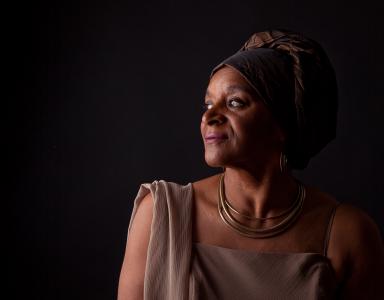
Underground Venues 6, 17 & 20 July.
The first thing to say is that there is unlikely to be better singing to be heard at this year's Fringe than that offered by Annette Reis and I strongly recommend that you take the opportunity to hear her later in the Festival.
Annette's career goes back to the 1960s when she sang with - and recorded with - some of the greats on the British Blues scene. It is only in recent years that she has returned to public performance of this music. For this event she has chosen to focus on songs associated with Bessie Smith, Billie Holiday and Nina Simone - three black American women singers who each left an indelible mark on 20th century music.
In her introductions to the songs Annette reminds us that Bessie, Billie and Nina didn't have easy lives. They were variously affected by drug and alcohol misuse, by mental illness or suffered abusive relationships. They lived in a time and place where to be black put you at risk and disadvantage. But Annette wanted to remind us that their lives were not wholly burdened by sadness; there were also periods of joy and contentment and success.
So whilst Annette sang "Strange Fruit" (one of the greatest and most moving songs in any repertoire) and Nina's angry "Mississippi God Damn" she also found room for "Alexander Ragtime Band", "The Way You Look Tonight" and "My baby just cares for me".
Annette didn't try to impersonate Bessie, Billie or Nina - I imagine that she has too much respect for them to do that - but she treated each and every song seriously, searching for the right tone and delivery. Among the Blues standards she sang were "St Louis Blues", "Backwater Blues", "I put a spell on you" and - departing from the Bessie/Billie/Nina theme - the magnificent "Trouble In Mind".
Annette was supported by Buxton-based guitarist Will Hawthorne in a performance that was an unqualified triumph.
Keith Savage �



